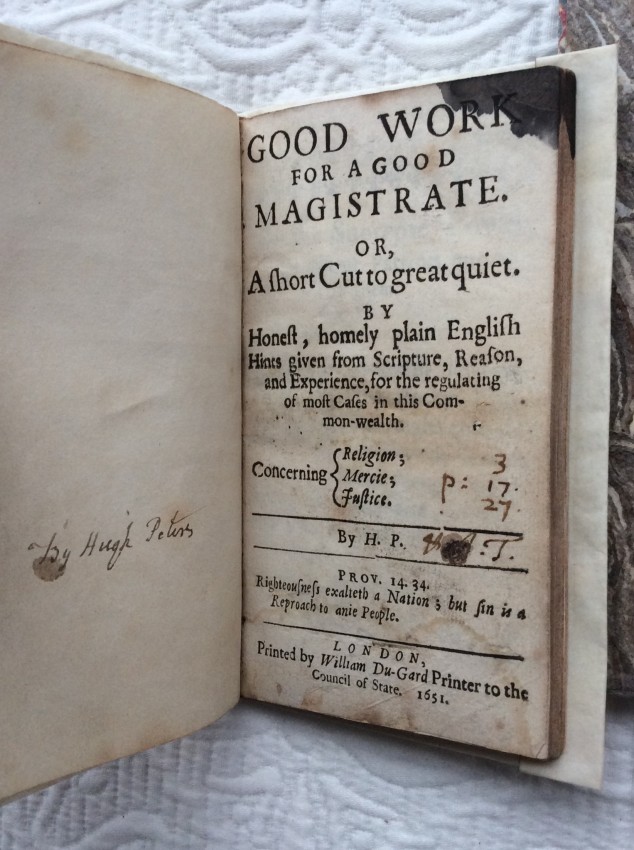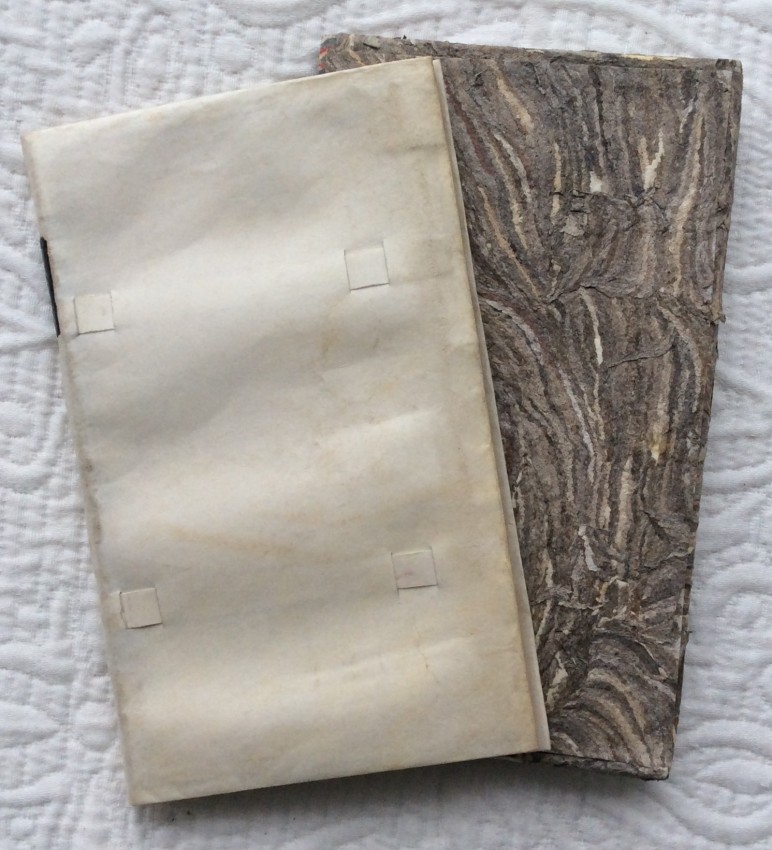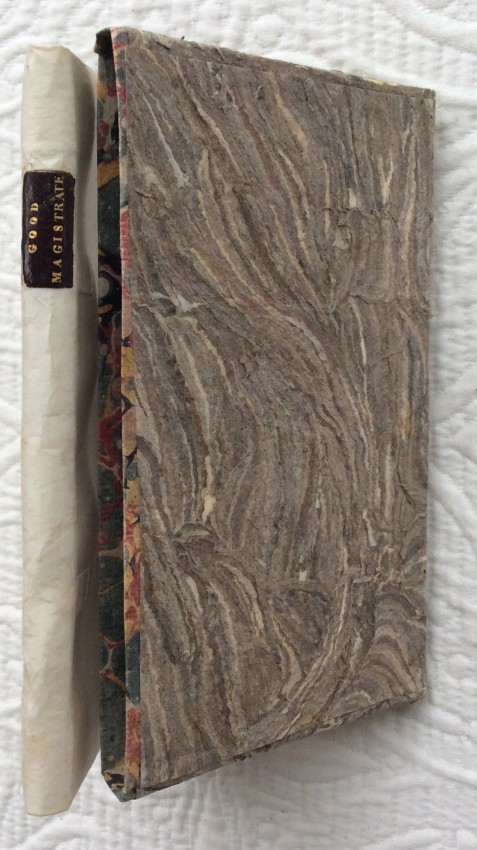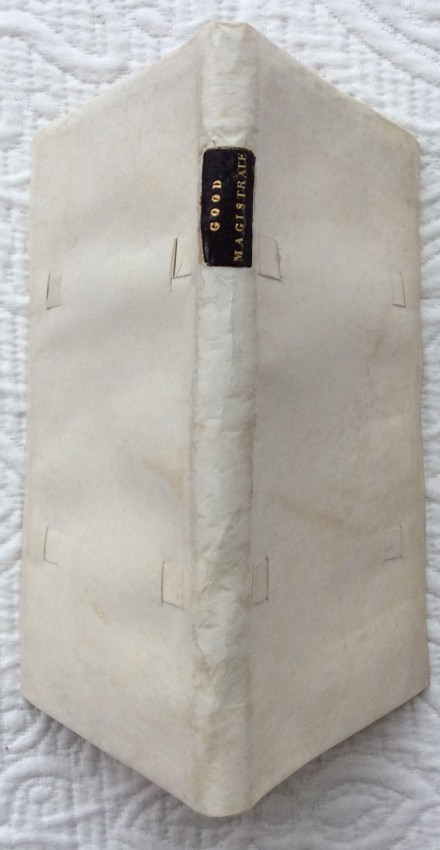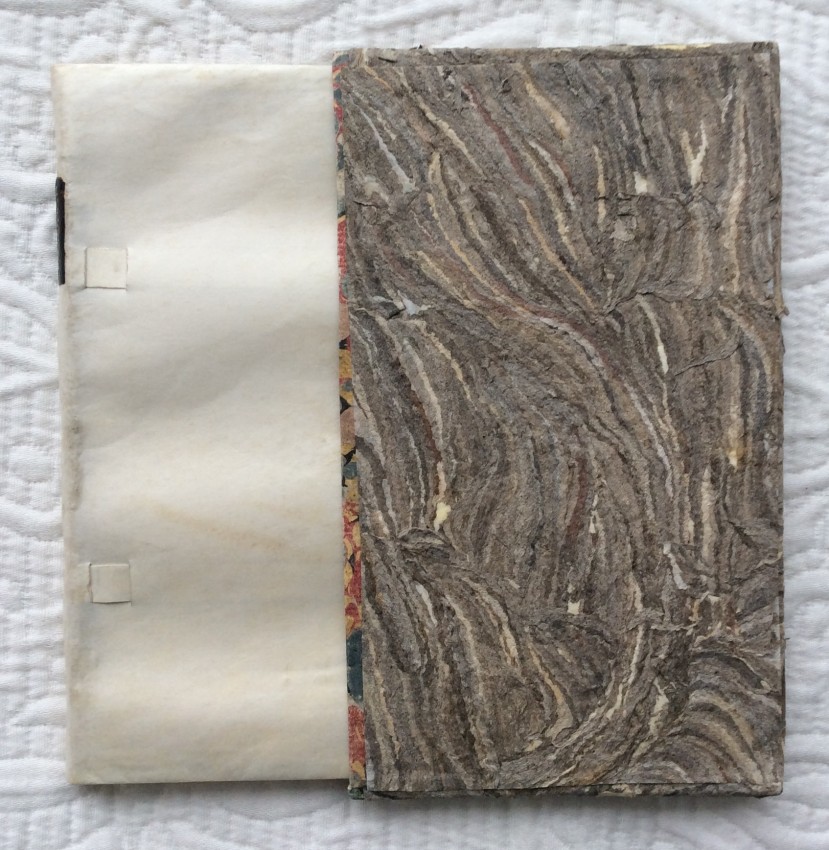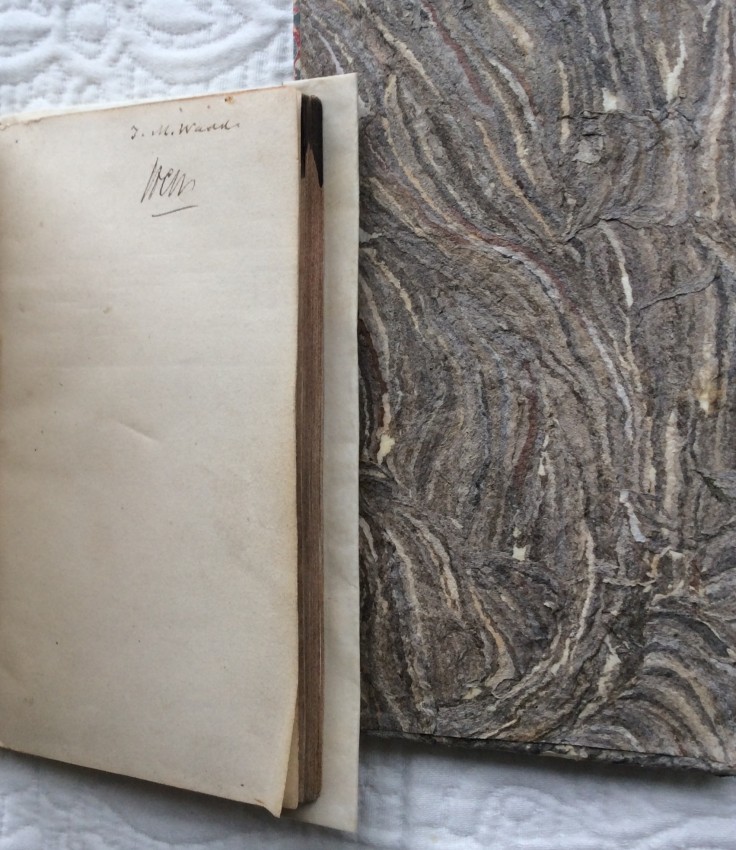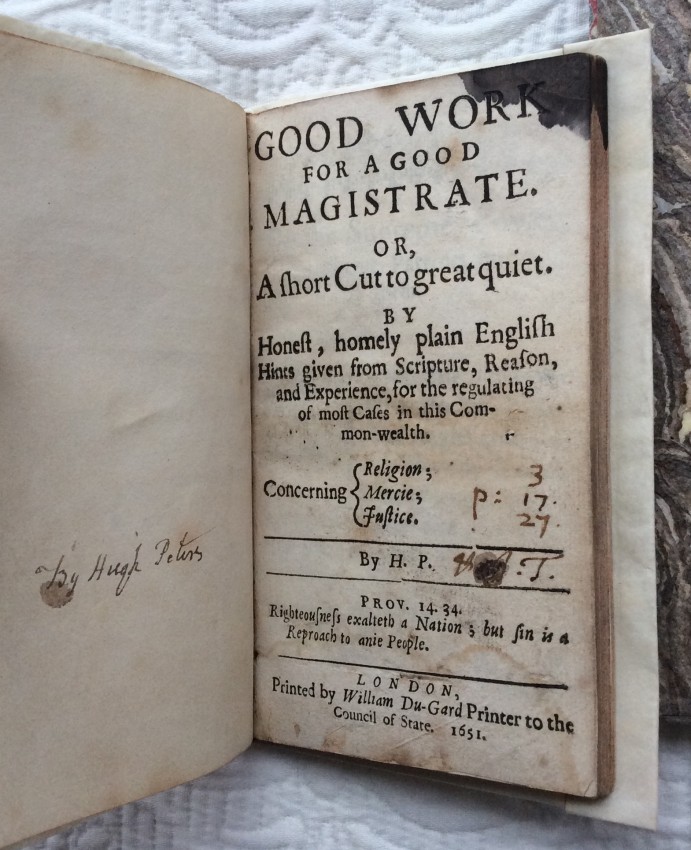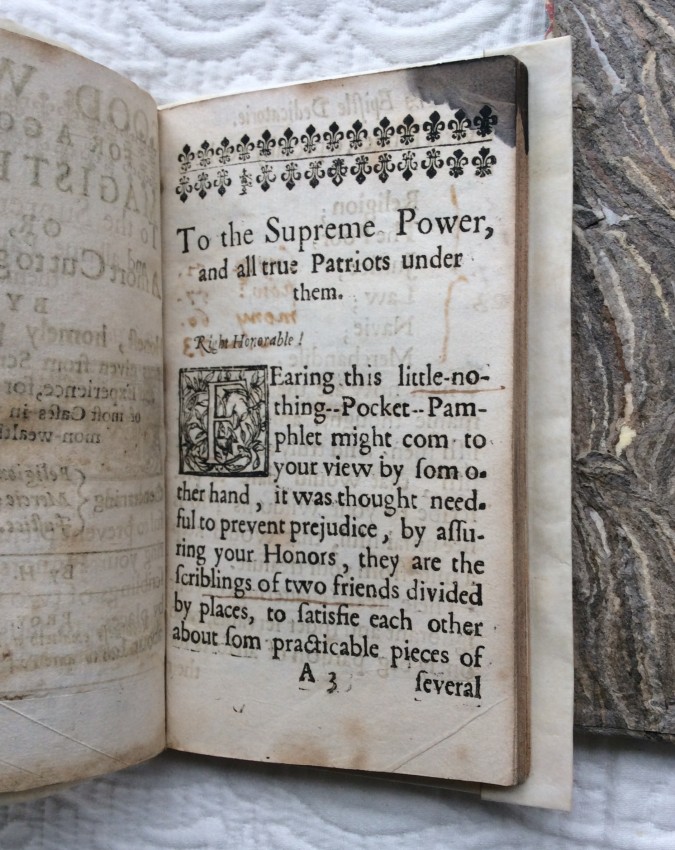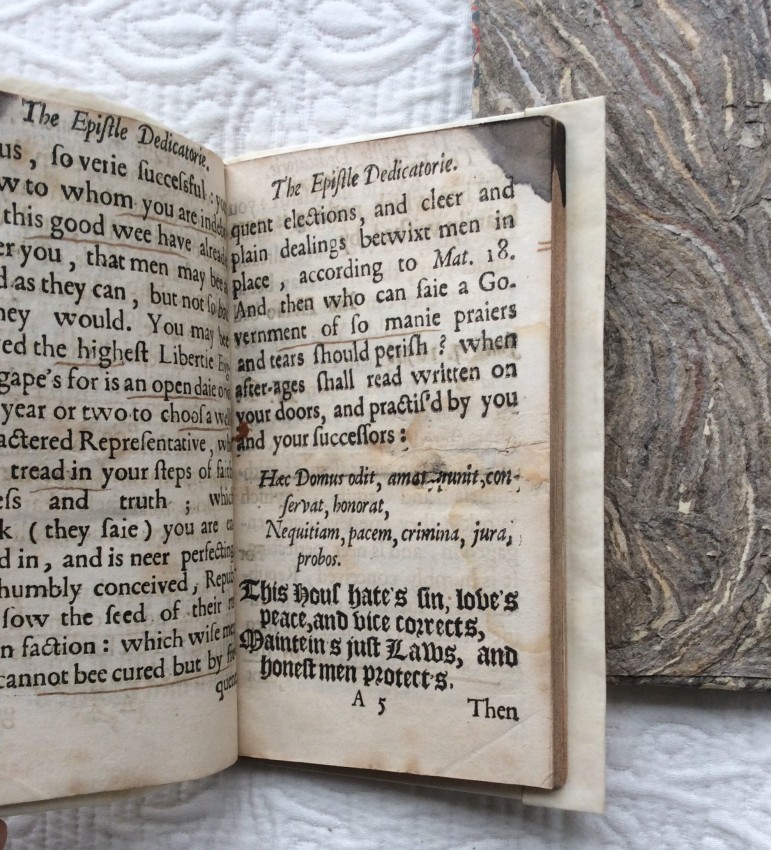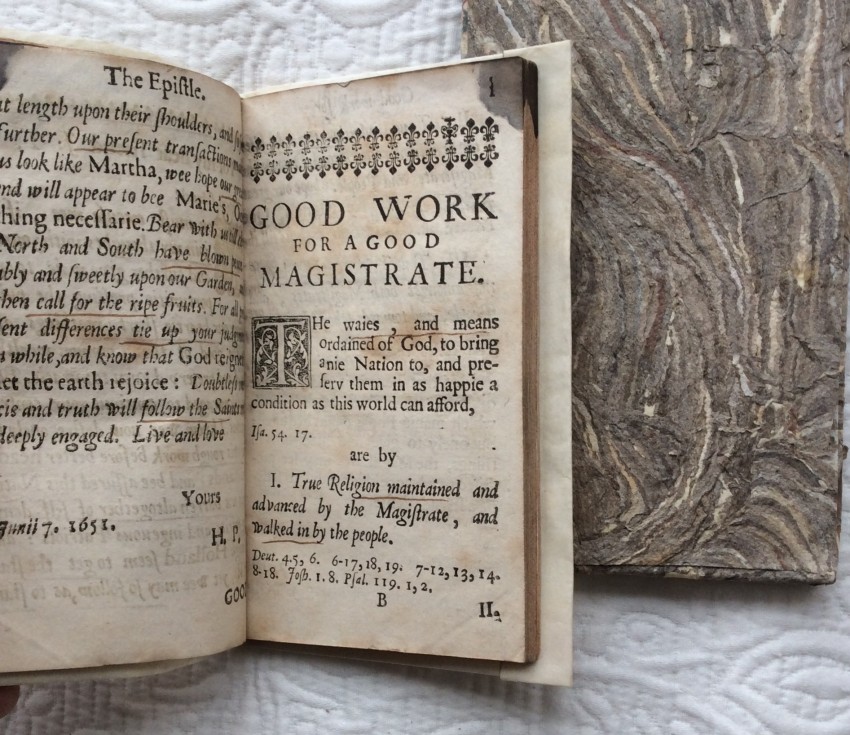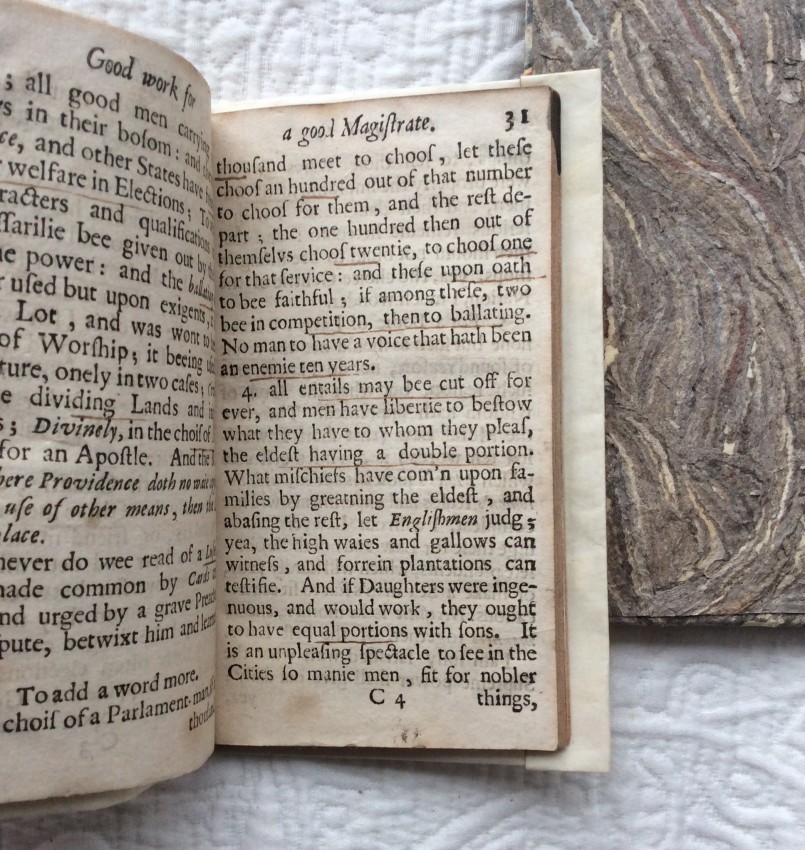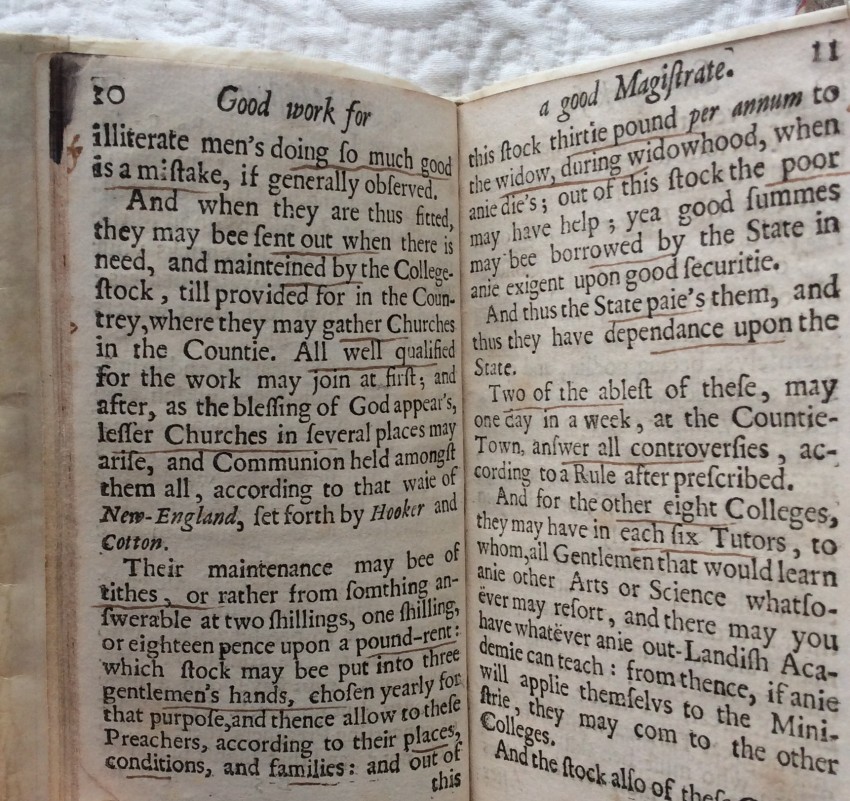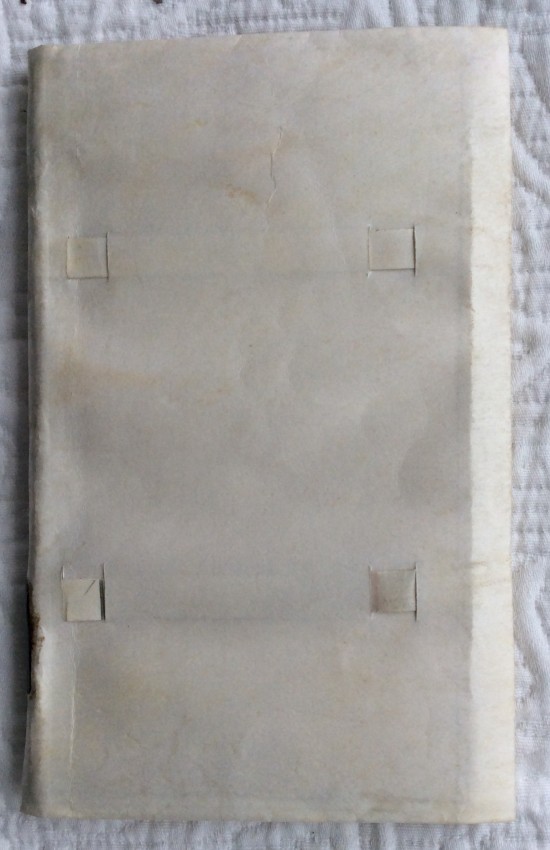[Hugh PETERS or PETER (1598-1660) and ‘J.T.’].
Good Work for a Good Magistrate. Or, A short cut to great quiet. By honest, homely plain English hints given from Scripture, reason, and experience, for the regulating of most cases in this Common-wealth. Concerning religion; mercie; justice. By H.P. [and J.T.].
London: printed by William Du-Gard, printer to the Council of State, 1651.12⁰ (5 ¼ x 3 inches; 135 x 77mm). Pp. [iii-x], 1-109, [i-vii] pp. (lacking front ?blank A1, and 2 final blanks F11 and F12, ink stain to upper outer corners, occasional small tears [A5 and D3 repaired], close-shaved).
Bound to style in limp vellum with yapp fore-edges, slipcase constructed from some old materials and some recent, including 'wasp' paper (see images).
Provenance: extensive underling and occasional notes, all appear to be by a single early hand; HCW (initials on front free endpaper); J.M. Wadd (?, signature on front free endpaper).
Influenced by his time in the Netherlands and Massachusetts, regicide Hugh Peters makes some radical but humane suggestions - including (almost) equal property rights for women. 19 copies of this work are listed by ESTC (8 in the US), but it is nonetheless very rare on the market. The last copy listed as having been offered for sale was by Goodspeed in 1960 for $100. The Harmsworth / Britwell copy appears to have been the last copy sold at auction (in 1952). (See http://downloads.it.ox.ac.uk/ota-public/tcp/Texts-HTML/free/A90/A90537.html for the full text).
Note: little attention seems to have been paid to the fact that (according to Peters himself), this work was a joint effort. In his dedication to “the Supreme Power” (?Cromwell) Peters notes that “this little-nothing-Pocket-Pamphlet” is the result of “the scribblings of two friends divided by places”. And, in the supplemental dedication Peters identifies the “friend” as “my dear friend J.T.” There are two leading candidates: John Treffry (1594-1658, Peters’ cousin) and John Trefusis, jnr. (1612-1654, a second cousin, who married Sir Francis Drake’s great niece).
“Whenever Peters was in health, his restless energy led him to engage in every kind of public business. One of the questions he had most at heart was the reform of the law. While in Massachusetts he had twice been appointed on committees for drawing up a code of laws for the colony, and in Holland he had seen much which he thought worthy of imitation in England. On 17 Jan. 1652 parliament appointed a committee of twenty-one persons for the reformation of the law, of whom Peters was one. ‘None of them,’ writes Whitelocke, ‘was more active in this business than Mr. Hugh Peters, the minister, who understood little of the law, but was very opinionative, …’ (Memorials, ed. 1853, iii. 388). In a tract published in July 1651, entitled ‘Good Work for a Good Magistrate,’ he summed up his scheme of reforms, proposing, among other things, a register of land titles and wills, and suggesting that when that was established the old records in the Tower, being merely monuments of tyranny, might be burnt (p. 33). … In the same pamphlet Peters proposed the setting up of a bank in London like that of Amsterdam, the establishment of public warehouses and docks, the institution of a better system for guarding against fires in London, and the adoption of the Dutch system of providing for the poor throughout the country. Unfortunately, none of these public-spirited proposals led to any practical result.” (C.H. Firth in the DNB).
Peters was in New England between 1635 and 1641, but as “far back as 1628 … [he] had become connected with the Massachusetts patentees, and on 30 May 1628 had signed their instructions to John Endecott (Hutchinson, History of Massachusetts Bay, 1765, i. 9). His relationship with John Winthrop supplied an additional motive for emigration, and he also states that many of his acquaintance when going for New England had engaged him to come to them when they sent for him (Last Legacy, p. 101). Accordingly, evading with some difficulty the attempt of the English government to arrest him on his way from Holland, Peters arrived at Boston in October 1635 (Mass. Hist. Soc. Coll. 5th ser. i. 211).
On 3 March 1635 – 6 he was admitted a freeman of Massachusetts, and on 21 Dec. following was established as minister of the church at Salem. From the very first he took a prominent part in all the affairs of the colony. He began by arranging, in conjunction with Henry Vane, a meeting between Dudley and Winthrop, in order to effect a reconciliation between them. His own views, as well as his connection with the Winthrop family, led him usually to act in harmony with Winthrop. In ecclesiastical matters Peters was at this time less liberal than he subsequently became. He disapproved of the favour which Vane as governor showed to Mrs. Hutchinson, and publicly rebuked him for seeking to restrain the deliberations of the clergy, telling him to consider his youth and short experience of the things of God (Winthrop, History of New England, ed. Savage, i. 202, 211, 249, 446). At the trial of Mrs. Hutchinson in November 1637, Peters was one of the chief accusers, and endeavoured to browbeat a witness who spoke in her favour (Hutchinson, History of Massachusetts Bay, 1765, ii. 490, 503, 519). He also maintained orthodoxy and ecclesiastical authority by excommunicating Roger Williams and others, and utilised the execution of one of his flock to warn the spectators to take heed of revelations and to respect the ordinance of excommunication (ib. i. 420; Winthrop, i. 336). More to his credit were his successful endeavours to appease the dissensions of the church at Piscataqua, and his indefatigable zeal in preaching (ib. i. 222, 225, ii. 34; Mass. Hist. Soc. Coll. 3rd ser. iii. 106). Under his ministry the church at Salem and the whole community increased in numbers and prosperity (ib. 1st ser. vi. 250).
Ecclesiastical duties, however, occupied only a portion of the time and energy of Peters. He interested himself in the foundation of the new colony at the mouth of the Connecticut, and endeavoured to reconcile the disputes between the English settlers there and the Dutch (Winthrop, ii. 32). Influenced by what he had seen in Holland, he made the economic development of the colony his special care. In one of his first sermons at Boston he urged the government ‘to take order for employment of people (especially women and children) in the winter time, for he feared that idleness would be the ruin of both church and commonwealth.’ He went from place to place ‘labouring to raise up men to a public frame of spirit,’ till he obtained subscriptions sufficient to set on foot the fishing business. And ‘being a man of a very public spirit and singular activity for all occasions,’ he procured others to join him in building a ship, in order that the colonists might be induced by his example to provide shipping of their own. On another occasion, when the colony was in distress for provisions, Peters bought the whole lading of a ship and resold it to the different communities, according to their needs, at a much lower rate than they could have purchased it from the merchants (ib. i. 210, 221, 222, ii. 29).
In 1641 the fortunes of the colony were greatly affected by the changed situation in England. The stream of emigration stopped, trade decreased, and it was thought necessary to send three agents to England who should represent the case of the colony to its creditors, and appeal to its friends for continued support. Peters was selected as one of these agents, in spite of the opposition of Endecott. They were also charged ‘to be ready to make use of any opportunity God should offer for the good of the country here, as also to give any advice as it should be required for the settling the right form of church discipline there.’ With this combined ecclesiastical and commercial mission Peters left New England in August 1641 (ib. ii. 30, 37). He succeeded in sending back commodities to the value of 500l. for the colony; but finding the fulfilment of his mission obstructed by the distractions of the time, and his own means running short, Peters accepted the post of chaplain to the forces raised by the adventurers for the reduction of Ireland.” (op. cit.)
Goodspeed note: “Hugh Peters came to New England in 1635 and became pastor of the Church in Salem, succeeding Roger Williams, whose doctrines he disclaimed and whose adherents he excommunicated. In 1638 he assisted in collecting and revising the Colonial laws, and in 1641 returned to England to procure an alteration in the laws of excise and trade. He remained in England and became a chaplain in the Parliamentary Army. At the restoration he was committed to the Tower and was executed for high treason [as a Regicide].”
ESTC R203158 (19 copies, 8 in the US); Kress 1227; Sabin, 61193; Thomason, E.1364[2]; Wing (2nd ed.) P1706.
- Binding Condition: excellent
- Overall Condition: acceptable
- Size: 5 ¼ x 3 ins;135 x 77mm
- Sold By: Shadowrock Rare Books
- Contact Person: Adam Langlands
- Country: United States
- Email: [email protected]
- Telephone: 001-860-248-1547
- Preferred Payment Methods: Paypal, US$ checks and wire transfers, major credit cards through paypal
- Trade Associations: AA Approved


